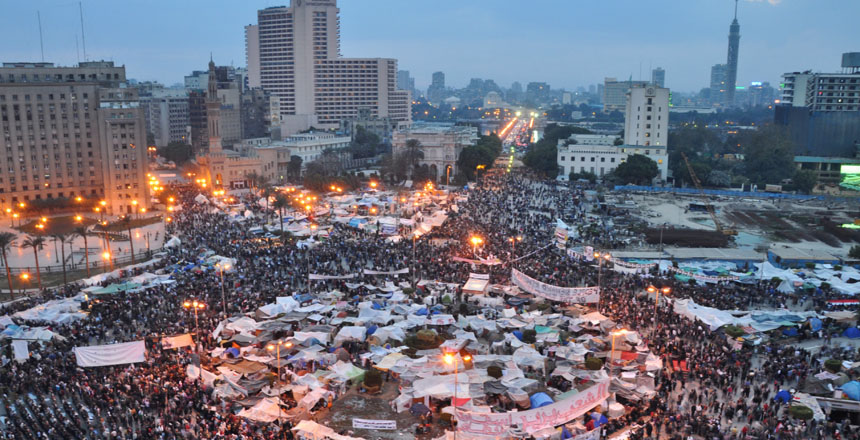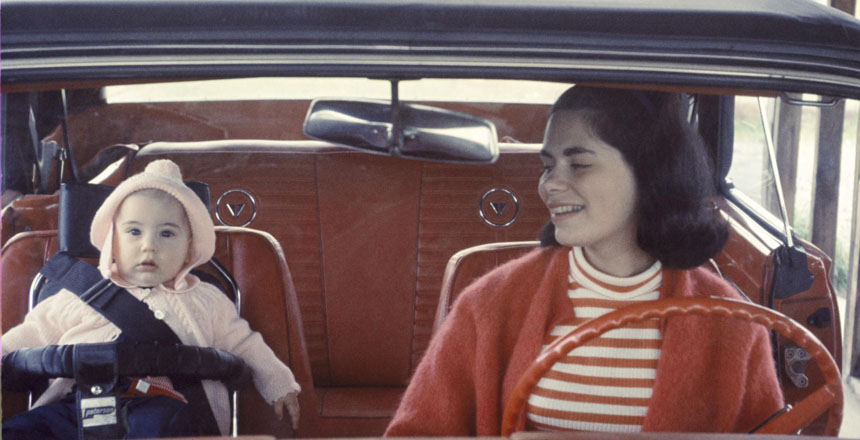
The author was in revolutionary Cairo, seen above, in 2011, when she heard that her mother’s cancer was back. (Image: Jonathan Rashad via Flickr)
My mother’s groaning woke me around midnight. It was a completely primordial sound, without language or cadence. Later, I understood it was the involuntary noise people emit when they are in unbearable pain.
I padded over to her open bedroom door. She lay rigidly on her back, marooned in her enormous white bed. Her face, illuminated by a dim light, was covered in a thin sheen of moisture. “I’m sorry I woke you,” she whispered, as though it hurt to speak.
I shook a painkiller out of one of the prescription bottles clustered on her bedside table. “Take this,” I said, brusquely to disguise my fear. “I’ll bring you a fresh glass of juice.”
“I can’t keep anything down,” she said in a low voice. “Not even water.” Suddenly she reached for the schissel, the chipped yellow enamel bowl she’d inherited from her grandmother, and vomited. I remembered her using that bowl, many years ago, to mix sweet, crumbly mixtures of butter, sugar, cinnamon and chopped nuts that she made into cakes and pastries.
“Never mind,” I said cheerily, like an efficient English nanny addressing a child. “I’ll change the sheets.”
Bent nearly double, she shuffled to the toilet and stayed there while I quickly stripped the bed, put clean covers on her pillows and quilt, then washed the schissel in the kitchen sink.
The glass of water I had pressed into her hands made her vomit again, and now she was too weak to stand. So I tried to slide the sheets under her body, which is how we discovered that she could no longer roll over. And that is when the screaming started in my head — although I smiled and murmured and tried to sound efficient.
“Hold on to the mattress cover and I’ll roll you,” I said. “There. Now, back again. Hold on to my neck. That’s it.”
“Don’t worry about me, darling,” she said in a reassuring, maternal voice. “I’m fine.” And then she groaned as if she were being ripped apart on a medieval rack. Those sounds competed with the wordless screaming in my head. I think she’d stopped hearing herself.
Despite years of witnessing political violence as a foreign correspondent in the Middle East, I had no experience with death of a personal nature. Now my fortress without attachments — no children, husband or even intimate friends — was under assault. There was no work to confer status or provide escape. No one was interested in what I had seen or experienced in that far away place of hot sun, excitable people and incomprehensible conflicts.
“Dr. Bernstein will be there first thing in the morning,” the doctor on call told me when I called. “It sounds as though your mother has to go to the palliative unit, but they don’t process admissions on Sunday until 9 o’clock.”
“Could we … call an ambulance?” I asked. “I don’t see how she can go on like this for another six hours.”
The doctor sighed, not unsympathetically, and said, “If you take her to the emergency room she will just wait for five hours to be triaged. So just try to keep her comfortable until Dr. Bernstein arrives.”
How did we get through those hours? I massaged her feet, gently, with some lotion — unscented, because she hated perfumes. I filed her fingernails, because she was so vain about her perfectly groomed hands with their tapering fingers. I told her gossipy stories about the eccentric venal politicians I had interviewed. I held the schissel when she bent her head forward.
During one of the pre-dawn hours she touched my hand and said, “I am so glad you are here with me.
Our entire, painful relationship was wrapped up in that simple sentence. For more than two decades I hadn’t spent more than a week in Canada in any given year. After I moved to Tel Aviv, I sometimes skipped a year. Our connection was one of unspoken pain, blame and longing and I think she found it distressing to spend time with me, too, because she never visited me. Not once, in the 11 years I lived in the Middle East. But she called me several times each week, and she was the only person in my life whose calls never went unanswered, even though our conversations were always careful, dull and disappointing.
When my sister emailed that the cancer was back and I should think about coming for a visit, I was in chaotic, exciting, revolutionary Cairo of 2011.
And then, less than two weeks after receiving my sister’s email, I was in tidy, placid Toronto, traveling the symmetrical downtown streets from her sterile, high-rise apartment building to Princess Margaret Hospital. Our days were scheduled according to chemotherapy sessions and doctor’s appointments. In between, my mother lay in bed watching cooking shows, while I communicated with her by preparing elaborate dishes that she admired but had no appetite to eat.
Shortly after the sun rose, my mother asked me to wash her. “The doctor will be here soon, and I smell fershtunkeneh,” she said. “I can’t see him like this.”
So I filled a kitchen bowl with warm water, gingerly worked a towel under her hips, dipped a cotton washcloth and sponged her ruined, bone-ridged body, which I remembered as broad-hipped and full-breasted.
She inhaled with exaggerated, child-like pleasure, turned her face toward me and said, “Oh, you added rose water. How lovely.”
Dr. Bernstein, who wore a big crocheted yarmulke and kept his mobile phone in a pouch hooked to his belt, arrived at 8.30 a.m.
“Well,” he said. “We can keep you comfortable here, with an IV and a visiting nurse. Or you can go to the palliative unit at the hospital, where you’ll have round-the-clock care. It’s up to you.”
My mother hesitated. She looked at me, then back at Dr. Bernstein. The palliative unit was the last stop. It meant she would not come home again.
“Your eyes are saying ‘hospital,’” he said.
“Hospital,” she answered.
She died three weeks later, and I was an orphan.
Lisa Goldman moved to Brooklyn in 2012 and now works for the New America Foundation. Follow her on Twitter @lisang.









